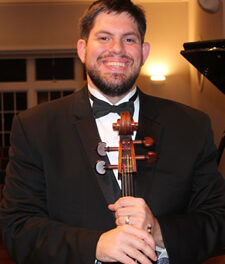OdysseyStage Theatre, a Chapel Hill, NC-based community theater, will stage A Man for All Seasons April 29-May 8 at the St. Thomas More School in Chapel Hill. British dramatist Robert Bolt’s riveting historical drama about the ill-fated friendship between King Henry VIII (1491-1547) and Sir Thomas More (1478-1535) premiered on July 1, 1960 at the Globe Theatre in London.
Director Walter Herz says, “I first read the play about two years ago — my sister was a freshman in high school at the time and was reading it for her English class, so I casually picked it up one afternoon when I was visiting my folks. I didn’t put it down until I’d read it about four or five times cover to cover, and I knew I had to either act in it or direct it. Thanks to OdysseyStage, it turned out to be the latter.”
A Man for All Seasons made its Broadway debut on Nov. 22, 1961 at the ANTA Playhouse and closed on June 1, 1963, after 637performances. It earned four 1962 Tony Awards®, including Best Play, Tony Award® Best Actor in Play (Paul Scofield as More), Best Direction of a Play (Noel Willman), and Best Producer of a Play (Robert Whitehead and Roger L. Stevens). Keith Baxter, who played Henry, also won a 1962 Theatre World Award for his performance.
The 1966 British motion picture, produced and directed by Fred Zinnemann, won six 1967 Academy Awards, including Best Picture; Best Director; Best Actor in a Leading Role (Paul Scofield); Best Cinematography, Color (Ted Moore); Best Costume Design, Color (Elizabeth Haffenden and Joan Bridge); and Best Writing, Screenplay Based on Material from Another Medium (Robert Bolt). It was nominated for two others — Best Actor in a Supporting Role (Robert Shaw as King Henry VIII) and Best Actress in a Supporting Role (Wendy Hiller as More’s devoted wife, Alice).
Walter Herz says, “I come to the play without any bias or experience with it — I’ve never worked on a production of it, never seen it performed, never even seen the famous Paul Scofield film version, though I know it may be something we’re measured against. This is a completely fresh take on the story, playing only with that the playwright gives us. No more, no less.”
He adds, “What I most like about A Man for All Seasons is that it takes a legendary political and religious conflict and boils it down to the needs and desires of a couple of human beings. In plain terms, Thomas More died because Henry VIII would not allow him to live — but Robert Bolt paints both More and Henry with a very detailed brush, erasing notions of pure good and evil, showing two men with different priorities and internal struggles, each trying to save his soul the best way he knows how.
“The same goes for all the other characters in the play,” Herz claims, “from More’s family to the Spanish Ambassador to the liar who finally condemns More to execution. Bolt never stoops to present them as one-dimensional advancers of plot. And, of course, there is the main question of the play: How much will a man sacrifice to keep a clean conscience? At a time when many of us and our leaders shirk from responsibility, the question is incredibly relevant and more than a little troubling.
When the curtain rises, Herz says, “Thomas More (John Paul Middlesworth) is a trusted advisor to King Henry VIII (Nick Karner). When Henry decides to divorce his barren Spanish queen to marry his lover, however, the Catholic More — and the sacraments of the Church — stand in his way.
“Friends and colleagues like the Duke of Norfolk (Phil Crone) and Cardinal Wolsey (Reid Dalton) try to persuade him to bless Henry’s divorce, or at least approve; others, like the Spanish ambassador Chapuys (Carroll Credle), encourage him to be a more outspoken opponent of the king. Indifferent to both extremes, More remains silently firm in his convictions, incurring the king’s enmity towards him and his family: wife Alice (Megan Mazzocchi), daughter Alice (Seton Mazzocchi), and son-in-law Will Roper (Michael Beck).
“On the brink of insanity and desperately hungry for a male heir,” Herz points out, “Henry casts the Catholic Church from the shores of England, names himself head of the new Anglican Church and authorizes his own divorce. He also commands all English subjects to swear an oath declaring him supreme over all foreign leaders — including the Pope.”
Herz adds, “More remains silent — he neither affirms the Henry’s supremacy nor denies it, infuriating the king, who instructs his agent Cromwell (Tim Wiest) to ‘persuade’ More. The task is easier said than done, and Cromwell must finally weave an intricate net for More using the traitorous Richard Rich (Jeremy McCamic), a woman (Meredith Dillard) who once tried to bribe More, and the newly named Archbishop of Canterbury (Steve Barbato). But More never wavers, holding firm to his belief in the law and the honesty of man — the question is, where has that gotten anyone?”
Walter Herz claims, “Our guide through these waters is the Common Man (Thaddaeus Edwards), who literally changes hats to take us from More’s House to Wolsey’s study to the court where More finally hears his death sentence. And even though the Common Man is an otherworldly narrator — a fly on the wall — not even he escapes unscathed.”
In addition to director Walter Herz, the show’s production team includes technical director and set, lighting, and sound designer Rebecca Miller; costume designer Diana Helias; and stage manager Johanna Edelman.
“I went into this production,” declares Herz, “with a three-word maxim: simplify, simplify, simplify. If you read Bolt’s stage directions — which were intended for the original West End and Broadway stagings — you’ll see that he calls for props to be flown in, banners to be lowered, etc. Our performance space, though more than ample for our usual needs, could certainly not satisfy a strict interpretation of the stage directions as written.
“So, we ignored, overhauled and reshaped the original stage directions,” Herz says, “and crafted an incredibly organic production, using the fewest props possible and relying almost entirely on the actors’ ability to make us believe. That’s theater, right?
“That was the only real challenge: finding practical and simple ways to do expensive and complex things. And I think we did it very successfully,” he adds.
Herz says, “Rebecca [Miller] designed a beautifully simple set consisting of, basically, two sets of stairs and a thrust into the audience. This one room is every room and this table every table in the play — one principal adherence to Bolt’s original plan — and I think Rebecca found the perfect balance between non-descript and distinctive.
“Because the set doesn’t ever change,” Herz says, “the lighting constantly does, and it — along with the Common Man — is responsible for taking us steps and miles, hours and years, with the passing of a few seconds. Again, Rebecca came up with the perfect emotional lighting range — nothing fancy for the sake of fancy, simply a steadfast and confident light that gets us where we need to be and shows us what we need to see.”
He adds, “I researched other productions of the play to see if they had tried to adhere to the 16th century period costumes and found that most of them did. These were elaborate productions that aimed to be ‘accurate,’ dressing their actors in fur coats and golden chains — basically, a costume pageant with a bit of Renaissance fair thrown in.
“I wanted none of that,” Herz emphasizes. “Bolt’s play is so incredibly good that I wanted to distract no attention from its dialogue and characters. Not that the cast would be onstage naked, or all dressed in black — we just had to find the right world, a dress style that was not so alien we could not relate to it but not so current that we wouldn’t grasp the play’s sense of history.”
He adds, “We decided to take a page from today’s common treatments of Shakespeare and find neutral ground — in this case, a 1940s American style — not to set it exactly in a certain time period or place, but to let us see that this is a world different from our own, but not really. This was the challenge Diana [Helias] faced, and I believe she more than stepped up, she knocked it out of the park.
Herz says, “If you come expecting to see a historical costume pageant laboriously spoken in the Queen’s English, you’ll be disappointed. This is a dynamic, breathing play showing a very human struggle between two men — and all the lives caught between them. The actors are dressed simply, effect no artificial accents, and want only to tell the story of Thomas More clearly and with no more weight than the circumstances of the play demand. This is drama first, history second.”
OdysseyStage Theatre presents A Man for All Seasons Friday-Saturday, April 29-30 and May 6-7, at 8 p.m. and Sunday, May 1 and 8, at 3 p.m. in the theater of the St. Thomas More School, 920 Carmichael Street/U.S. 15-501, Chapel Hill, North Carolina. $10 ($8 students and seniors). 919/260-1074 or e-mail odyssey_stage@hotmail.com. OdysseyStage Theatre: http://www.odysseystagetheatre.org [inactive 5/05]. Internet Broadway Database: http://www.ibdb.com/show.asp?ID=1177. Internet Movie Database: http://www.imdb.com/title/tt0060665/.












